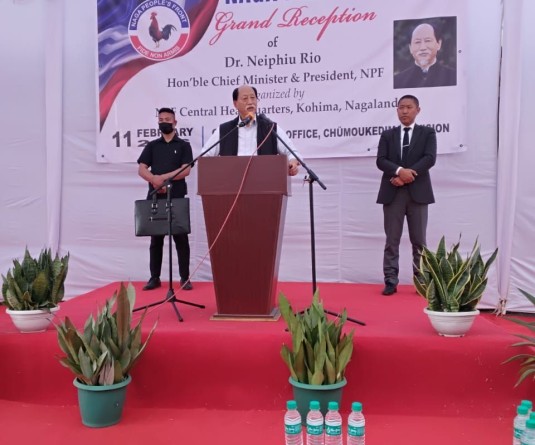
Dimapur, January 6 (MExN): The Chakhroma Public Organisation (CPO), on January 6, has submitted another representation to the Chief Secretary regarding district demarcation, which among others, requested the State Government “not to succumb to any pressure in the interest of justice.”
The CPO’s representation came as a response to memorandum (dated 22/12/2021) submitted by what it termed as “certain sections of people purportedly representing 41 different villages/colonies/organizations within Dhansiripar Sub-Division opposing the creation of Chümoukedima District and thereby deciding that they shall continue to remain under Dimapur District.”
Consequently, the CPO is “once again constrained to submit” the representation to highlight the various issues, noted the representation released to the media here.
In the representation, the CPO asserted that it is an “undeniable fact that the first settlers of the erstwhile Dimapur district (prior to 20 December, 2021) were the Angamis, Kacharis and Mikirs and subsequently, Garos, Kukis and some other people group migrated to the plains of Dimapur since the early part of the 20th Century.”
As for other Naga villages, especially within the Dhansiripar Sub-Division, most villages were established only after formation of Nagaland State except Shokhovi and Pimla, it maintained, adding that the “traditional Chakhroma area extends beyond the present Nagaland-Assam boundary in West and Northwest, while on the Southern side it borders with the traditional land of the Zeliang tribe.”
Few Kachari, Kuki and Garo villages were within the traditional Chakhroma land and the inhabitants of these villages were indigenous inhabitants of the district, it acknowledged.
The CPO further pointed out that the first administrative headquarter of the Naga Hills was set up by the British India at Chümoukedima in 1866 and subsequently, it was shifted to Kohima in 1878. Over the years Naga inhabited areas have been demarcated into many districts including the last notification, it said.
In this context, the CPO reiterated that when Dimapur district was separated from Kohima district in 1997, it did not touched upon any inter-tribal land holding or affect any traditional boundary of any tribe or tribes.
“As such, it was harmonious and CPO as well as every tribe living within Dimapur District honoured it without any complaint,” it said.
The notification for the up-gradation of Dimapur Sub-Division into a district also unequivocally stated that “The jurisdiction of the new District of Dimapur shall comprise of the existing sub-Divisions of Dimapur and Niuland with Head Quarters at Chumukedima,” it asserted.
On completion of all the infrastructures for the office of Deputy Commissioner after a quarter of a century, few individuals and organizations raised objection for shifting the office of the Deputy Commission to the newly constructed site at Chümoukedima citing very unreasonable and flimsy reasons, it noted.
“Regrettably, the State Government succumbed to the pressures without consulting the stake holders or without having any broad-based discussion on the merits of shifting to a more spacious and centrally located area of the district,” it added, wondering “whether the State administration is being run to suit the interest of a few individuals rather than giving good administration to the people.”
It further clarified that CPO had never demanded the creation of Chümoukedima district but had submitted a proposal dated 30/10/2021 stating in unambiguous terms that “… If the State Government is not in a position to shift the office of the Deputy Commissioner as notified and duly published in the Official Gazzete to the newly constructed site at Chümoukedima, the CPO resolved that a new district be created with the District as Chümoukedima District.”
The CPO also observed that the State Government’s December 20 Notification created the Chümoukedima district with headquarters at Chümoukedima comprising of (i) Existing administrative area of Medziphema Sub-Division, (ii) Existing administrative area of Dhansiripar Sub-Division and (iii) Administrative area of Seithekema EAC Circle.
If the administrative area of Dhansiripar Sub-Division is to be bifurcated and be placed under two districts as demanded the December 22 Memorandum, it is going to disturb the “age old traditional land boundary between the Chakhroma and the Zeliang in its southwestern boundary,” it asserted.
“The CPO is not against any individual establishing village or villages within its traditional land. However, by establishing a village or villages does not give any individual’s right to usurp the rights of the traditional land owners,” it added.
The rights over land lays with the traditional land owners in Nagaland and “every tribe has its own well demarcated traditional land boundary with its neighbouring tribe/tribes so is also with the Chakhroma people,” it pointed out.
In this connection, the CPO stated that placing certain areas of Dhansiripar Sub-Division under Dimapur District will “create unnecessary troubles and unrest among the people leading to litigations which will harm the interest of the public in general and the Chakhroma people in particular.”
Further, a thin strip of land along the inter-state boundary of Nagaland and Assam under Dimapur District may not be in the interest of the state as a whole, it said.
Moreover, basing on the memorandum cited above, whether the areas demanded to be placed under Dimapur District is contiguous with the Dimapur Sadar area is another aspect which the authority may look into, the CPO urged.
Accordingly, the CPO “once again” appealed to the State Government not to “succumb to unreasonable pressures as it was done in the case of shifting Deputy Commissioner’s Office” and strictly adhere to the areas notified December 20.
If any changes are to be effected to December 20 notification without consultation and concurrence of the CPO, the “Chakhroma people too may react,” cautioned the CPO’s representation appended by its President Vichütuolie Mere and General Secretary Mhiesisato Vüprü.




